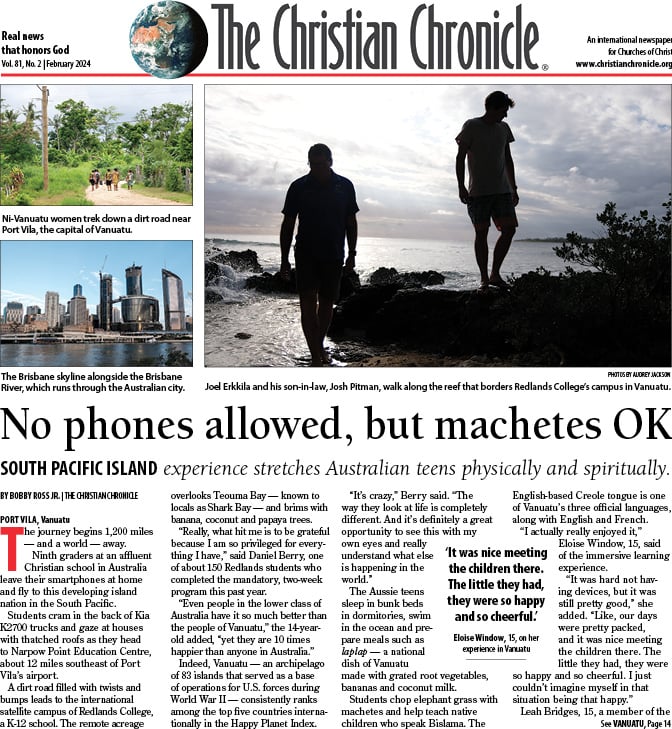Editorial: Viewing ministry not as a career but as a calling
Churches of Christ face a serious shortage of ministers. Congregations looking to hire hear crickets. The number stepping away from ministry increases.
This is not news, of course, to Christian Chronicle readers. But the enrollment decline in programs that prepare preachers — as detailed in Cheryl Mann Bacon’s report this month — should grab our attention.
Sacred Calling: Read all the stories in the series
How many do you know who are excited and eager to enter a life of ministry? The supply-chain crisis can’t help but impact the Lord’s work.
In the interest of full disclosure, I served as a full-time minister for more than 20 years. In October 2022, I was invited to serve as chair and now dean of Oklahoma Christian University’s College of Bible. I am still blessed to minister with the Wilshire Church of Christ in Oklahoma City, though my role has changed.
I wish I could tell you Oklahoma Christian’s numbers are different, with record numbers of students flooding our Bible department, studiously preparing to fill the void of preachers, youth ministers, children’s ministers and missionaries. But sadly, our story is the same as our brothers and sisters elsewhere.

Students sing during a chapel assembly at Oklahoma Christian University in Oklahoma City.
Research and anecdotes point in the same direction: Many people are leaving, and few people are entering the ministry. The reasons are many.
Good ministry is not easy. Effective ministers balance a wide range of issues and settings: bedsides, living rooms, conference rooms, classrooms and pulpits. Ministers must be comfortable with books and people. They are expected to be personally and publicly engaging. Ministers need to be relevant in an ever-changing information age where every statement is instantly fact-checked. And, as in all generations, ministers are called to present the radical message of the Gospel in a fast-paced, disinterested and distracted world.
When viewed as merely a career choice, ministry is a hard sell. Our autonomous nature and smaller congregations often mean the absence of modern employment benefits: health insurance, retirement, career advancement and educational support. Compared to peers with similar education and experience, ministers face less financial stability and mobility.
If viewed only as a career, the declining numbers make perfect sense. Most ministers have marketable skills for more lucrative and socially attractive careers.
But that’s much of the problem.
“Ministry is not simply a career. … Rather than ask the traditional questions about career, we should ask questions of calling. What talents and abilities has God gifted us?”
Ministry is not simply a career. Ministers are “called” and “sent.” After making the shocking claim that “whoever calls on the name of the Lord will be saved,” Paul added, “How, then, can they call on the one they have not believed in? And how can they believe in the one of whom they have not heard? And how can they hear without someone preaching to them? And how can anyone preach unless they are sent?”
Rather than ask the traditional questions about career, we should ask questions of calling. What talents and abilities has God gifted us? What have spiritually wise sisters and brothers spoken into my life and purpose? What needs has God shown? What opportunities has God provided?
Admittedly, the language of calling makes us nervous. We have seen far too many people claiming to be “called” or “sent,” asserting questionable authority or privilege. Personal interest and passion have often been mistaken for God’s calling. While God is known to use such things, they are not always indicative of his will.
Despite these abuses, Scripture does not shy away from the concept of calling. We are all called to salvation by the Gospel (2 Thessalonians 2:14). But just as everyone is called to service, teaching and generosity, there are differences in the “gifts according to the grace given to us” (Romans 12:6).
God expects his church to recognize and utilize these gifts for the building up of his church. Perhaps the shortage of ministers can be addressed, in part, by the church being more perceptive and honoring those called into full-time ministry.
We need spiritual men and women willing to speak into the lives of people who have the gifts and opportunities to serve. And all of us must be passionate about how we can best present Jesus to the world around us. — Jeremie Beller, for the Editorial Board



